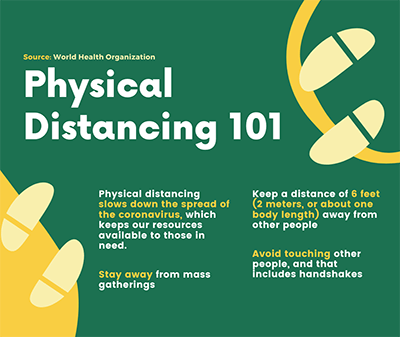About Pandemics
A pandemic is a disease outbreak across several countries or continents that affects a lot of people. Pandemics are typically caused by viruses that easily spread from person to person, like the current Covid-19 pandemic. Although pandemics are relatively rare, historically occurring roughly every 30 – 35 years, new viruses and local outbreaks can occur at any time. It’s tough to predict when one will happen. For this reason, it’s crucial to prepare ahead of time to have systems in place to protect people and their livelihoods.
While scientists have not concluded that climate change played a direct role in the Covid-19 pandemic, they believe there are connections between climate change and growing rates of infectious diseases. Loss of biodiversity, a warming planet, and deforestation are a few examples of disruptions to the planet that influence how diseases emerge and spread.
Impacts on Frontline Communities

Pandemics have a global impact, but even locally, Covid-19 has illustrated that health disasters disproportionately impact people of color, people with low incomes, service workers, seniors, and people with underlying health conditions. The Covid Tracking Project shows how Covid-19 impacts Black, Indigenous, Latinx, and People of Color the most. This is because of pre-pandemic realities, including structural racism that has limited access to healthcare and worsened other social determinants of health for people of color. For example, people of color are more likely to have underlying conditions like asthma and diabetes, be essential workers, live in multi-generational homes, have less access to individual transportation, and are more likely to live in areas with poor air quality – all of which increase exposure and risk to Covid-19. Covid-19 reduced life expectancy in the U.S. in 2020 by 0.68 years for the white population versus 2.10 and 3.05 years for Black and Latino populations, respectively illustrating the disproportionate impact this pandemic is having on people of color.
Actions to Take
It is critical to work towards health equity in ways that center frontline communities, both in times of crisis and not.
For individuals and households
- Pandemics highlight the importance of our collective health. When one person is sick, that impacts us all. Ready.gov has a list of actions you can take before and during a pandemic to keep yourself and others safe.
- If the government provides you with financial assistance and you don’t need it, consider donating to community-based organizations serving frontline communities. One possibility amongst many is your local food bank, as food insecurity can increase during a pandemic. Find your local food bank here.
For community-based organizations and affordable housing providers
- Plan for the future: While every disease is unique and the specific actions to keep your residents or community safe may vary, we’ve learned a lot from this pandemic, including the importance of:
- Maintaining a healthy home: With so many people taking refuge from exposure to Covid-19 in their homes, it is critical to build and maintain housing units in a healthy way. A home should be connected (e.g., access to the internet), free of toxins (e.g., lead, mold, radon), climate-controlled, and promote healing and connection to the environment, to name a few.
- Develop and maintain strong relationships with residents and up-to-date contact information to ensure easy communication around policies and procedures related to a continually evolving pandemic situation.
- Foster community and cross-sector partnerships: During times of crisis, like a pandemic, it is much easier to activate existing relationships, collaboratives, and partnerships to meet the critical needs of your community members. Developing these relationships and mechanisms for collaboration can be a good way to prepare for future pandemics while meeting existing needs in your community now.
- Create a Pandemic Response Plan. Use this guide from the Centers for Disease Control and Prevention.
- Conduct an assessment to learn who in your community might be most at risk. Create systems to check in on those community members and meet their needs through mutual aid.
For local government
- Develop pathways for sustainable funding and support for on-the-ground partners addressing your community’s social needs and offering pathways towards access to quality social determinants of health.
- For example, during the Covid-19 pandemic, community-based organizations like affordable housing providers stepped in to serve the critical health and economic needs that arose for their residents. Within a month of the pandemic on-set, affordable housing providers were creating impromptu food pantries in their community rooms and supplying tablets and computers to residents. As the pandemic continued, they hosted on-site vaccine clinics and education sessions. Despite these important roles, these organizations struggle to sustainably fund resident service coordinators and on-site programming necessary during the pandemic. Federal, State, and Local governments can work to create sustainable funding for this critical infrastructure needed during a pandemic and to support health equity at all times.
- Support critical local needs that arise to allow residents to prioritize their health and safety over their economic needs. Some of the programs doing that during this pandemic include:
- Create programs to support local businesses, frontline workers, people who are undocumented, and people who lose their jobs.
For Philanthropy
- Fund programs that support local businesses, frontline workers, people who are undocumented, and people who lose their jobs.
- When pandemics hit, be flexible with existing grantees as they may need to use their funds in new and emergent ways to meet the critical needs of the community they are serving.
- This toolkit helps funders and non-profits understand the landscape of philanthropic partners working on climate, health, and equity.
- Training